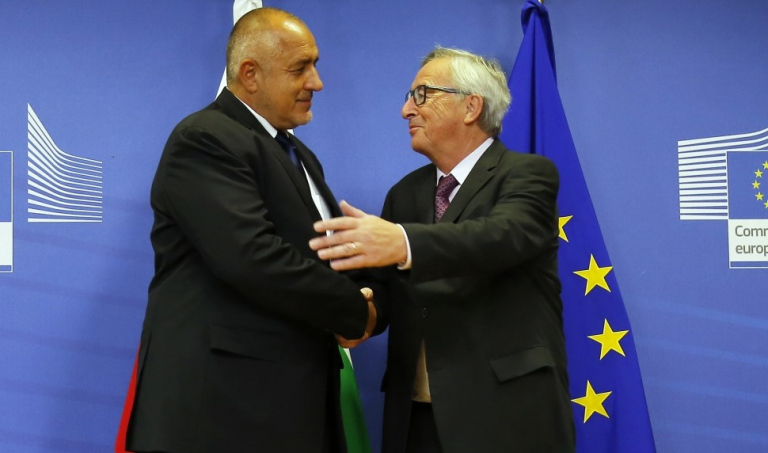
21.06.2019
The President of the European Commission Jean-Claude Juncker and the Prime Minister of Bulgaria Boyko Borissov both welcome the important stage attained in the development of the Balkan Gas hub. Today the Energy Committee of the Parliament adopted amendments to the Energy Act on a first reading, in order to provide a programme for the realisation of certain annual amounts of gas on the gas exchange from both the public provider and end costumers, which will lead to unprecedented opening of the Bulgarian gas market.
The proposed package of measures will lead to a much-needed change regarding the natural gas market in Bulgaria. It will result in significant steps towards the formation of a liquid environment and liberal natural gas market not only in Bulgaria, but also in the whole region. These steps relate to the efforts of both the European Commission and the Bulgarian government for the creation of a single natural gas market.
The President of the EC Juncker said, “We want the energy to be directed towards Bulgaria and the whole of Europe. I welcome such a positive development, leading to the opening of the gas market and benefiting the consumers of gas in Bulgaria and Southeast Europe. My Commission will continue to support Bulgaria in the implementation of its plans for the regional gas hub – we share the Bulgarian government‘s viewpoint on this issue.”
Prime Minister Borissov noted, “I am proud to declare that through the introduction of a programme for offering certain amounts of gas for free trade and the continuous work regarding the Balkan Gas hub project, Bulgaria will demonstrate its engagement in playing a leading role in the development of an open gas market in Southeast Europe. The successful cooperation with the European Commission and the concrete efforts made by the Bulgarian government facilitated the introduction of significant changes in the natural gas market in Bulgaria, which will undoubtedly bring substantial benefits for everyone.”
After the programme is confirmed by the final version of the Energy Act and the creation of the gas exchange, it will offer certain amounts of gas for free trade and it is expected have positive effects on the gas market competition in the region. Greater competition will lead to a wider choice and lower prices and will increase the security of the supplies for households and corporations. This is why the European Commission supported the reforms of the market and the undertaken measures for increasing liquidity, including through the Balkan Gas hub in Bulgaria.
The gas exchange will help Bulgaria and the region so they can fully benefit from the final processes in the development of the sector in regards to the increase in exports of liquefied natural gas. This will strengthen competition and will give more opportunities for the development of the economy in Bulgaria and the region.
General Information
The Balkan Gas hub project is based on the idea that major quantities of gas from different sources will enter in a physical point in the Varna region, from where further transfer and trade will be carried out through the gas hub in Bulgaria. The European Commission financially supports the Balkan gas hub project and has invested a grant of EUR 920 000 under the “Connecting Europe Facility” for a feasibility study. The grant will cover 50% of its cost.
The purpose of the feasibility study is to devise detailed assessment of the commercial and technological viability of the project, concrete business model, evaluation of the risks of the project, and finalization of the regulatory framework and structure of the project’s financing.
The project of the Balkan Gas hub includes an additional infrastructure with the goal of supplying Central/Western, Southeast, and Eastern Europe with new gas, so the security of supplies increases through the provided access to additional sources of gas. In this context, constructing the interconnector between Bulgaria and Greece and the gas pipelines with Serbia and Romania as soon as possible is of utmost importance.
The “Juncker” Commission is committed to all of the objectives of the Energy Union, including energy security and the creation of a well-diversified and competitive gas market.
Our strategy for diversification is focused on priorities such as the Balkan gas hub, the realization of the Southern Gas Corridor, the construction of liquefied gas hub for the Mediterranean and through the increase of the access to liquefied natural gas and storages, for which the European Commission adopted a strategy in February 2016.
Our preference is for the strong regional cooperation to give concrete results: key sites of gas infrastructure in the Baltic region are being currently implemented. We have supported financially the construction of gas interconnections between Poland and Lithuania, and the Baltic Gas Interconnector between Finland and Estonia. We approved state aid in regards to the liquefied natural gas terminal in Klaipeda, Lithuania, and we do actively support the creation of a new Northern Corridor, connecting Norway and Poland through Danish territory.